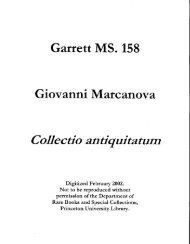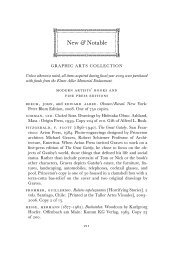You also want an ePaper? Increase the reach of your titles
YUMPU automatically turns print PDFs into web optimized ePapers that Google loves.
“in care of the address on the letter-head” were heavily underlined<br />
by the poet. Since the letter-head address is “Avery House, 1 Queen’s<br />
Gate Gardens,” where I was apparently staying only “until Saturday<br />
evening of this week,” it is likely that the letter did not arrive<br />
on the poet’s desk in time for him to send an answer to Avery<br />
House, and if my earlier letters addressed to the “Foreign Office of<br />
Greece” did not make their way to him until they had been forwarded<br />
from Athens, he had no other way of getting in touch with<br />
me before I left England to spend the summer in Greece. A little<br />
over one year later, I tried again, when my dissertation had been<br />
reduced to the poetry of Cavafy and Seferis and was very near<br />
completion: “Dear Mr. Seferis,” I wrote, “I don’t know whether<br />
you remember me, but I am the young man who approached you<br />
over a year ago in connection with a thesis I am writing, . . . ”<br />
The result of this persistence was an invitation to tea in early<br />
June of 1952 at Seferis’s apartment near Sloane Square. I was beside<br />
myself with joy. What an opportunity to clear up tenacious<br />
ambiguities, even if it was at the last minute. My wife and I were<br />
received graciously by Mr. and Mrs. Seferis, he a heavy man, baldheaded,<br />
round-faced, with dark eyebrows separated by deep frown<br />
lines, the eyes penetrating, the mouth always on the verge of curving<br />
into a smile, and she a slight woman with beautiful, delicate<br />
features and golden hair. We had our tea, and then the poet and I<br />
withdrew to one end of the living room for our talk about his poetry<br />
and some of the remaining problems I had in understanding<br />
it. Six hours later, the bleary-eyed poet, speech increasingly slow,<br />
suggested that maybe we had talked enough about his work, since<br />
it was clear that I now understood it better than he did, even if I<br />
continued to make the mistake of seeing everything symbolically.<br />
“Those statues, my dear,” he said at one point. “Those statues are<br />
not always symbols. They exist. If you travel in Greece, you will<br />
see that statues belong to the landscape. They are real. And the<br />
stones. The stones are there under your feet, my dear, or there in<br />
front of you for your hand to caress.”<br />
The conversation had gone on so long because I had been unrelenting<br />
in my pursuit of possible meanings and the poet had been<br />
very reticent about answering my questions directly, so that I kept<br />
feeling that his potentially valuable commentary was constantly slipping<br />
through my fingers. Of course he was trying very hard to save<br />
371















